 What Is a License Plate Reader and Can Police Track You Using It?
What Is a License Plate Reader and Can Police Track You Using It?
Table of Contents
- Hawai'i License Plate
- Hawai'i License Plate Design and Formats
- Hawai'i Vanity License Plate
- Most Popular Hawai'i Special Plate Numbers
- Hawai'i License Plate Lookup
- What Do I Need to Get a License Plate in Hawai'i?
- Differences Between a Passenger License Plate and Commercial License Plate in Hawai'i
- How To Renew License Plate in Hawai'i
- How To Transfer a License Plate in Hawai'i
- Hawai'i License Plate Lookup Frequently Asked Questions (FAQ)
 Hawai'i License Plate
Hawai'i License Plate
A Hawai'i license plate is a vehicle's metallic tag that helps people identify any vehicle registered in the state, and it differentiates one car from another. In addition, a license plate in Hawai'i can help identify a vehicle owner. The state mandates license plates for automobiles and requires both front and rear plates. Per Hawai'i Revised Statutes 249-7(b), upon issuing a tag, a vehicle owner must securely fasten the number plates on their vehicle, one on the rear and the other on the front, at a location provided by the vehicle manufacturer.
In Hawai'i, if a motor vehicle does not have a spot for license plates, the owner must securely fasten them to the bumpers in a manner to prevent them from swinging. However, only one license plate is required for motorcycles, trailers, and semi-trailers, and it must be attached to the rear at a location provided by the manufacturer. In the absence of such a location, the license plate can be fastened securely to any other open spot at the rear. Vehicle owners must ensure that license plates are displayed entirely unobscured and kept reasonably clean always.
Hawai'i issues two broad categories of license plates. These are standard, non-passenger, and specialty/vanity license plates:
- Standard License Plates - These are issued to vehicle owners who need regular plate numbers. Standard passenger license plates are given to vehicles used for transportation with about 10 passengers (including the driver)
- Specialty License Plates - These are subdivided into veteran specialty plates, special (vanity) plates, and organization plates:
- Veteran License Plates in Hawai'i include Prisoner of War, Veteran, Combat Veteran, Pearl Harbor Survivor, and WWII Veteran plates
- Special (Vanity) License Plates are issued to persons interested in obtaining personalized plate characters
- Organization License Plates are issued to non-profit groups/entities, although on request. The available ones include the Bishop Museum, Hawai'ian Humane Society, America United, Volcanoes National Park, Kahiau - A Tennis Foundation, and Aloha Pregnancy Care and Counseling Center
- Non-Passenger License Plates - These are issued for vehicles that do not carry passengers or those used for primarily governmental purposes. The two major types are the horseless carriage license plate and the honorary consul license plate
Vehicle registration and license plate issuance are decentralized and managed by each county government in Hawai'i; no statewide Department of Motor Vehicles exists. Vehicle owners in the state can obtain license plates at the City and County of Honolulu, County of Hawai'i, County of Maui, and County of Kauai. A typical Hawai'i license plate cannot have more than six characters, which may be letters, digits, or both (alphanumeric characters). The lower end of the plate has an "ALOHA STATE" inscription, while it carries the state's name written in block letters (Hawai'i) at the top. Generally, specialty license plates in the state have some additional features.
 Hawai'i License Plate Design and Formats
Hawai'i License Plate Design and Formats
Hawai'i license plate numbers are issued sequentially in order of demand. Generally, the letter sequence preceding the numerical digits signifies the issuing county Department of Motor Vehicles. For instance, Hawai'i license plates issued in the County of Maui begin with M, H is for the County of Hawai'i, K is for the County of Kaua'i, and N is for the City and County of Honolulu. However, these sequences are less obvious now as the alphabet sequences by county have been exhausted over the years.
The state has featured a rainbow graphic on the background of its license plates since 1991, and it is likely to be maintained all through 2024, although it is nearing the end of its lifecycle. However, modifying the alphanumeric plate number combinations while extending the life of the rainbow graphic is being considered. A typical Hawai'i license plate has three numbers preceded by three letters, but the arrangement may be different in specialty license plates. The top of the plate is embossed with the word "Hawai'i", and the bottom has the state's nickname, "ALOHA STATE", inscribed on it.
Standard License Plates
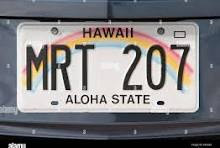
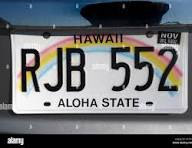
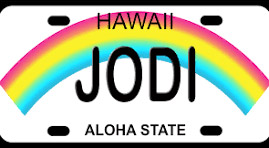
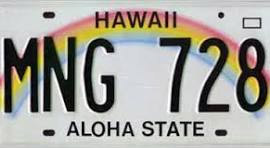
Personalized and Specialty License Plates

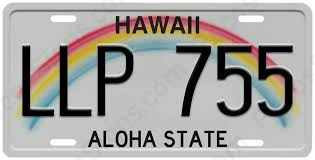
 Hawai'i Vanity License Plate
Hawai'i Vanity License Plate
Any personalized or custom license plate that allows a vehicle owner to choose their plate numbers in Hawai'i is known as a vanity license plate. Hawai'i vanity license plates are available for cars, motorcycles, trucks, and trailers registered with any county in the state, and they often come at an extra fee. Typically, the plates are limited to six numbers, letters, or a combination of both (no more than six characters). Only one hyphen can be used in addition to the six alphanumeric characters. Hawai'i prohibits using connotations of a profane, sexual, vulgar, or obscene nature or words relating to intimate body parts on vanity license plates.
You may appear in person at your county Department of Motor Vehicles (DMV) to apply for a Hawai'i vanity license plate or apply online if your county permits it. Depending on the county, you may be required to book an appointment before your visit. For instance, the County of Hawai'i requires potential vanity license plate holders to make an appointment with any Vehicle Registration and Licensing Office. Before filing your application, it is important to check if your preferred character combination is available. Your county DMV should provide an avenue to check this. For example, if you are in the City and County of Honolulu, the city's personalized plate website allows you to check the availability of your preferred vanity license plate characters.
For an in-person application, your County Department of Motor Vehicle staff will assist you with the license plate application during your visit. Once your request for license plate number combination is approved, the DMV will send you a letter in 60 to 90 days providing requirements and procedures. During this time, you must obtain regular license plates if you do not have any currently. You will be notified by mail to pick up your vanity license plates once they are ready, and state law requires that you submit your current license plates. The initial cost of a Hawai'i vanity license plate is $60. You will also be asked to pay a $25 annual charge in addition to your registration fees upon every renewal of your vehicle registration.
 Most Popular Hawai'i Special Plate Numbers
Most Popular Hawai'i Special Plate Numbers
The most popular special license plate numbers in Hawai'i include the following:
- Vietnam veterans license plate
- Purple Heart recipients license plate
- World War II veterans license plate
- Gold Star Family license plate
- Combat veterans license plate
- Former prisoners of war license plate
- Service veterans license plate
- Organization license plate:
- Support Our Troops license plate
- The Hawai'ian Humane Society license plate
 Hawai'i License Plate Lookup
Hawai'i License Plate Lookup
Hawai'i license plate lookup is a search performed to obtain certain information on any vehicle registered in the state using a vehicle's full license plate number. License plates search can be conducted for various reasons in the state, including the following:
- Investigating and tracking down vehicles involved in crimes (by law enforcement)
- Inspecting a used vehicle and uncovering detailed information about it before purchase
- Private investigations by authorized persons or entities
- Insurance purposes - Insurance companies may look up a prospective client's vehicle's license plate to gather information about them in a bid to ensure the person is not a liability
A Hawai'i license plate lookup can reveal a vehicle's accident history, title information, registration details, mileage and odometer readings, maintenance history, repossession history, and inspection checklist. It may also disclose if a vehicle has been reported stolen. If you want a full report from a plate number search in Hawai'i, contact the state's Department of Transportation. You can also look up a Hawai'i license plate using Recordsfinder or any other third-party website offering such services. Typically, you will only obtain a few details from a license plate lookup on any third-party website. Searching for comprehensive information about a vehicle on a license plate lookup website requires paying a nominal fee in most cases.
Hawai'i Reverse License Plate Number Search
A Hawai'i reverse license plate number search is typically conducted to retrieve information about any vehicle registered in the state. You can conduct a reverse license plate number search on a Hawai'i-registered vehicle using Recordsfinder. As a rule of thumb, it is important to have a legitimate reason for looking up a license plate and that reason must meet the Driver's Privacy Protection Act (DPPA) requirements. Otherwise, your request will not be processed.
 What Do I Need to Get a License Plate in Hawai'i?
What Do I Need to Get a License Plate in Hawai'i?
Whether it is a newly purchased vehicle or a car moved to Hawai'i from another state, you must register it with the Hawai'i Department of Transportation before you can obtain a license plate. Registration must be in the county where you live. While each county has its vehicle registration process, the disparities will generally be slight. For instance, to obtain a Hawai'i license plate, you will generally need the following documents:
- Safety Check Inspection failed for registration only
- Manufacturer Statement of Origin (MSO) signed and notarized by the dealer or the vehicle's Manufacturer Certificate of Origin (MCO)
- Certified Hawai'i Scale Weight (if the MSO or MSO does not specify the vehicle's weight)
- The most recent out-of-state certificate of vehicle registration (for an out-of-state vehicle moved into Hawai'i)
- Hawai'i driver's license or a valid state ID card
- A State of Hawai'i Form G-27 (Motor Vehicle Use Tax Certification) to determine if you will pay a use tax on your vehicle
- Application for Registration of Motor Vehicle Form (for an out-of-state vehicle)
- Proof of Insurance
- Proof of Vehicle Ownership (registration certificate from another state or a valid title)
Registration fees for Hawai'i license plates vary from county to county. Generally, the amount you pay is determined by the registration personnel. Depending on the county where you live, you can file your application for a Hawai'i license plate in any of the following local Motor Vehicle Licensing Offices (MVLOs):
County of MauiDivision of Motor Vehicles and Licensing
110 Alaihi Street, Suite 101
Kahului, HI 96732
Phone: (808) 270-7363 City and County of Honolulu
Motor Vehicle Title and Registration
925 Dillingham Blvd. #257
Honolulu, HI 96817
Phone: (808) 768-4325 County of Kauai
Division of Motor Vehicles
4444 Rice Street, Suite A480
Lihu' e, HI 96766
Phone: (808) 241-4242 County of Hawai'i
Vehicle Registration and Licensing
101 Pauahi Street, Suite 5
Hilo, HI 96720
Phone: (808) 961-8351
 Differences Between a Passenger License Plate and Commercial License Plate in Hawai'i
Differences Between a Passenger License Plate and Commercial License Plate in Hawai'i
Passenger license plates are generally issued for motor vehicles used primarily for personal use. On the other hand, commercial license plates are given to large vehicles serving commercial purposes. While there are no significant differences between Hawai'i passenger license plates and commercial license plates, a few differences do exist and are summarized in the table below:
| Feature | Commercial License Plate | Passenger License Plate |
|---|---|---|
| Vehicle Type | Typically issued for trucks and trailers. However, they can also be given to small vehicles (cars) owned by commercial entities or those used as taxis | Primarily issued to passenger vehicles not used for commercial purposes and cars not owned by business entities |
| Plate Number Character Combination | Most Hawai'i commercial license plate numbers are formatted as 123 ABC | A typical Hawai'i passenger license plate number is written in the format "ABC 123" |
| Cost of License Plate | Usually higher due to the vehicle's weight (County Weight Tax) | Typically lower than the cost of a commercial license plate |
The requirements for obtaining a Hawai'i passenger license plate and a commercial license plate are largely the same. Generally, vehicle owners must provide the vehicle proof of ownership, valid ID cards, and proof of insurance and do some paperwork, including completing an application form. However, license plate application fees may differ depending on the county and the vehicle's gross weight.
 How To Renew License Plate in Hawai'i
How To Renew License Plate in Hawai'i
Registration of vehicles with Hawai'i license plates must be renewed annually at the county Department of Motor Vehicles (DMVs) where they were registered or online. However, a vehicle registration renewal or license plate renewal process may differ slightly from county to county, but the requirements are mostly the same. Generally, county DMVs provide multiple options for vehicle owners to renew their license plates. For instance, in the County of Hawai'i, you can apply for your vehicle registration renewal online, at the county DMV Kiosk, or by mail. In addition to these methods, the City and County of Honolulu allow vehicle owners to renew their Hawai'i license plates in person at the county DMV office.
- License Plate Renewal at the County of Hawai'i
The county DMV will mail you renewal application forms at least 45 days before your vehicle registration expires. The renewal application form will indicate the renewal fee. You must submit an outstanding violation clearance letter for the vehicle whose registration is being renewed if your renewal application shows that you have outstanding ticket violations. Otherwise, the county DMV will not process your application. Additionally, you must provide a copy of your current Hawai'i Certificate of Safety Inspection if stipulated on your renewal form.
To renew your license plate by mail in the County of Hawai'i, mail a completed renewal application form and proof of payment to the county DMV office. To avoid late renewal registration, ensure your renewal application is postmarked no later than 10 business days before your registration expires.
Vehicle registration renewals can also be done online or at one of the county's registration renewal kiosk locations, especially if you did not receive a renewal application by mail. Do not use the online renewal application if your address has changed. Typically, the system at a kiosk location will guide you through the renewal process once you enter your vehicle identification number (VIN) and license plate number at the prompt. You can visit any of the following Registration Renewal Kiosk locations in the County of Hawai'i to complete and submit your license plate renewal application:
Waimea Foodland
Parker Ranch Center67-1185 Mamalahoa Highway
Kanulela, HI
Hilo Safeway Store
381 E Maka'ala StreetHilo, HI
County of Hawai'i - West Hawai'i Civic Center
Keohokalole HighwayBuilding C Snack Shop
Kailua-Kona, HI
Kona Safeway Store
75-1027 Henry StreetKailua-Kona, HI
County of Hawai'i - Aupuni Center Lobby
101 Pauahi StreetHilo, HI
 How To Transfer a License Plate in Hawai'i
How To Transfer a License Plate in Hawai'i
You cannot transfer a license plate from an old vehicle to a new one in Hawai'i because any license plate registered with a vehicle stays with it. However, it is possible to transfer the ownership of your vehicle to another person, but the license plate must remain with it. Typically, you will need to do some paperwork to effect the transfer. For example, you must complete Section B on the reverse side of the vehicle's certificate of title and endorse it before giving it to the new owner. Similarly, you must give the new owner the vehicle's certificate of inspection and the current certificate of registration.
After giving the new owner the necessary papers, fill out a transfer form and mail it to the county DMV office where you last registered the car. The new owner is also required to complete and sign in the appropriate spaces on the reverse side of the vehicle's certificate of title. Afterward, they must submit to the DMV the endorsed certificate of title and other documents given to them by the previous owner within 30 days.
 Hawai'i License Plate Lookup Frequently Asked Questions (FAQ)
Hawai'i License Plate Lookup Frequently Asked Questions (FAQ)
Can I Get a Replacement for My Lost License Plate in Hawai'i?
Yes. You can get a replacement Hawai'i license plate if yours is stolen, lost, or mutilated, and the replacement process in all the county DMVs is almost the same. Generally, be sure to report the situation to your county Police Department if it is a case of a stolen or lost license plate. Afterward, you must complete an Application for Replacement License Plate or Emblem Form provided by the county DMV and submit it alongside the appropriate fees at the DMV office. The cost of replacing a Hawai'i license plate varies by county. For instance, while the County of Maui charges $5.75 to replace license plates, vehicle owners in the City and County of Honolulu and the County of Hawai'i pay $5. Depending on the county, you may need to schedule an appointment for submission.
What Do Police See When They Run Your License Plates in Hawai'i?
Police and other law enforcement in Hawai'i run license plates for several reasons and can see the following information on vehicles and their owners:
- The status of vehicle registration, whether current, suspended, or expired
- Vehicle details, including the make, year, and model
- Vehicle owner's identifying information, including name and address (the DPPA does not restrict law enforcement agencies)
- Stolen vehicle notifications if the vehicle has been reported stolen
- The vehicle owner's criminal history
- Outstanding warrants on the vehicle owner
What is the Penalty for Driving with An Expired License Plate in Hawai'i?
All Hawai'i license plates expire one year after issuance and must be renewed annually to keep them active and prevent the owners from running afoul of state laws. Do not operate your vehicle in the state once your plate license/vehicle registration expires unless you have renewed it. Otherwise, you risk severe fines and/or some administrative charges.
You will be required to pay a penalty of $16 ($8 State Tax Penalty fee and $8 County Tax Penalty fee) for a passenger vehicle if you fail to renew your license plate before expiration. Similarly, you will pay a $40 penalty ($20 each for County Tax Penalty and State Tax Penalty fees) for a commercial vehicle with an expired registration. In Hawai'i, operating a motor vehicle with an expired temporary vehicle registration/license plate is a misdemeanor, and offenders risk up to 30 days of incarceration and/or a $500 fine.
Do I Need to Return License Plates in Hawai'i?
No. Although a Hawai'i license plate is state property, there is no penalty for not returning it in the event that a vehicle owner sells the car or relocates out of state. However, if you intend to return your license plate in Hawai'i for any reason, like moving out of state, you can do so. You can mail the license plates to the county Department of Motor Vehicles, where the vehicle was registered, with a letter stating your reason for returning them.
Can I Keep my Hawai'i License Plate if I Move to Another State?
Hawai'i will not penalize you for not returning your vehicle license plates when you move out of the state. You may keep the license plates, but you will still have to register your vehicle in your new state.
What Size are License Plates in Hawai'i?
A typical Hawai'i license plate measures 6" x 12", but motorcycle license plates are usually smaller and may measure 4" x 7".
How Long Can You Drive with Temporary License Plates in Hawai'i?
In Hawai'i, you can only drive your new vehicle with a temporary license plate within 30 days. Under state law, you must register the vehicle within this period and obtain permanent number plates and a valid emblem. Your county DMV will destroy the temporary number plates once it issues your permanent license plates.
What Are the Steps to Renew License Plates in Hawai'i?
You can renew your Hawai'i license plates in these few steps:
- Your County DMV mails you renewal application forms not less than 45 days before your vehicle registration expires
- Complete the vehicle registration renewal forms and mail them to your county DMV office. Alternatively, you can use any of the following options to submit your Hawai'i license plate renewal application:
- At any Kiosk location provided by your county DMV
- Online through your county DMV-approved portal
- In-person, if allowed by your county DMV
- Pay the required renewal application fee using any of the accepted payment forms
- Wait for the DMV to mail your renewed vehicle registration documents
What Do I Do if My License Plate is Lost or Stolen in Hawai'i?
- The first thing to do when your Hawai'i license plate is lost or stolen is to file a report with your county law enforcement agency
- Afterward, request a replacement license plate from your county Department of Motor Vehicle (DMV). The steps to obtain a replacement Hawai'i license plate are mostly the same, irrespective of the county, except that the fee charged may differ slightly
- For instance, to get a replacement license plate in the County of Hawai'i:
- Fill out an Application for Replacement Plate or Emblem Form. Ensure to select the reason for seeking a replacement license plate on the form
- Make an appointment with the County DMV
- Visit the county DMV office and submit the completed application form alongside copies of the following documents:
- Current certificate of registration
- Current and valid Hawai'i Certificate of Safety Inspection
- Return the remaining license plate if only one is missing or stolen
- Pay the required fee of $5.50 ($5 to replace a license plate and $0.50 to replace an emblem)
- To apply for a replacement license plate in the County of Maui:
- Complete and sign an Application for Replacement License Plate or Emblem Form
- Submit the application form with your vehicle's current certificate of registration at the county DMV office
- If only one license plate is lost or stolen, submit the other plate while submitting your application
- Pay a $6.25 fee ($5.75 for a license plate and $0.50 for an emblem)




